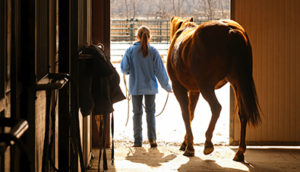Read the latest information on
Foot-and-mouth disease
 Horses are a common sight in regional and rural Australia, being used as utility animals on farms and with both riding and equestrian being popular sports. While rarely kept in large groups outside of studs or agistment properties, you’d be hard-pressed to find a town or village that didn’t have its fair share of horses in the surrounding area.
Horses are a common sight in regional and rural Australia, being used as utility animals on farms and with both riding and equestrian being popular sports. While rarely kept in large groups outside of studs or agistment properties, you’d be hard-pressed to find a town or village that didn’t have its fair share of horses in the surrounding area.
Though horses are not often thought of as livestock in the traditional sense, their popularity as companion animals and use in competitive sports nationwide means their health is an important consideration for owners and particularly for rural and peri-urban communities.
An outbreak of African Horse Sickness (AHS) in Thailand has prompted Animal Health Australia (AHA) to issue a reminder to horse owners to take biosecurity seriously and report unusual signs of illness in their horses.
“AHS, as the name suggests, is endemic to Africa, where the virus is also found in wild zebras,” says AHA’s Executive Manager Biosecurity and horse owner/fan, Dr Simon Humphrys.
“Though wild zebras often show no sign they are carrying the virus, horses, donkeys, mules and naïve zebras are at risk from what is often a deadly illness, which kills roughly four-in-five of all equids it infects.”
Over short distances, AHS is spread by biting midges. An intercontinental jump, however, is likely to be linked to the long-distance movement of an infected equid or, though it is less likely, an insect vector carrying the virus.
“The outbreak in Thailand is the first time we’ve seen AHS occur outside of Africa for nearly 30 years,” Dr Humphrys explained.
“Obviously there’s a huge effort going on right now to control this outbreak.”
Australia has strict import conditions on horses to prevent the entry of AHS and other equine diseases, and there is no evidence to suggest AHS has ever occurred in Australia.
Nonetheless AHA is eager to remind all horse owners that they have a responsibility to report unusual signs of illness in their animals.
“Infected animals often show reddened eyes and swelling of the face and breast area between the front legs, along with difficulty breathing and sometimes frothy discharge from the nostrils,” Dr Humphrys said.
“AHS does not affect humans, so there’s no reason to not investigate any suspicious signs and report the issue to your local private or government veterinarian.”
“If everyone does their bit, we can keep diseases like AHS from devastating our horse-loving communities.”
Horse owners whose horses are showing unusual signs can report the issue directly to their state’s animal health authority or via the Emergency Animal Disease Hotline: 1800 675 888.
Further information on the AHS outbreak can be found on the AHA website.
Those wanting to know more about keeping their horses safe from disease can visit the Farm Biosecurity website.